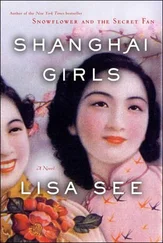Lisa See - Peony in Love
Здесь есть возможность читать онлайн «Lisa See - Peony in Love» весь текст электронной книги совершенно бесплатно (целиком полную версию без сокращений). В некоторых случаях можно слушать аудио, скачать через торрент в формате fb2 и присутствует краткое содержание. Жанр: Старинная литература, на английском языке. Описание произведения, (предисловие) а так же отзывы посетителей доступны на портале библиотеки ЛибКат.
- Название:Peony in Love
- Автор:
- Жанр:
- Год:неизвестен
- ISBN:нет данных
- Рейтинг книги:4 / 5. Голосов: 1
-
Избранное:Добавить в избранное
- Отзывы:
-
Ваша оценка:
- 80
- 1
- 2
- 3
- 4
- 5
Peony in Love: краткое содержание, описание и аннотация
Предлагаем к чтению аннотацию, описание, краткое содержание или предисловие (зависит от того, что написал сам автор книги «Peony in Love»). Если вы не нашли необходимую информацию о книге — напишите в комментариях, мы постараемся отыскать её.
Peony in Love — читать онлайн бесплатно полную книгу (весь текст) целиком
Ниже представлен текст книги, разбитый по страницам. Система сохранения места последней прочитанной страницы, позволяет с удобством читать онлайн бесплатно книгу «Peony in Love», без необходимости каждый раз заново искать на чём Вы остановились. Поставьте закладку, и сможете в любой момент перейти на страницу, на которой закончили чтение.
Интервал:
Закладка:
His words inspired me to be even more persistent. I got Ze interested in The Peony Pavilion. Again and again, she read my saved copy of Volume One. Soon she was never seen without it. She could recite whole portions of my commentary from memory.
“You never miss a word,” Ren said to her in admiration, and I was happy.
Eventually, Ze began writing notes about the opera on little pieces of paper. Were these her original thoughts or mine fed to her? They were both. Remembering what had happened when Ren told my father about his dreams and how we wrote together, I took care to remind Ze never to mention her writing—or me—to anyone. In this regard, she was an obedient second wife, acquiescing to the needs of wife number one.
Nevertheless, although everything was going well, I had a big problem.
I was a hungry ghost and I was becoming less and less.
( 1 6 0 )

Festival of Hungry Ghosts
as living g irls, ce rtain things happe n on sche dule whether we like them or not. We get our monthly bleeding.
The moon waxes and wanes. New Year comes, followed by the Spring Festival, Double Seven, the Festival of Hungry Ghosts, and the Autumn Moon Festival. We have no control over these things, yet our bodies are set in motion by them. At New Year, we clean our homes, prepare special foods, and make offerings not out of duty or custom but because the change in season and the hint of spring prods us, lures us, and compels us to those actions. The same is true in many ways for ghosts. We have the freedom to wander, but we’re also driven and called by tradition, instinct, and a desire to survive. I wanted to stay with Ren every second, but in the seventh month my hunger came on as strong and uncontrollable as bad cramps, a harvest moon, or firecrackers sending the Kitchen God to Heaven to report on a family. Even as I curled around my rafter or hovered over my sister-wife’s bed, I felt myself being beckoned, enticed, pulled outside.
Driven by hunger so powerful I couldn’t stand it, I left the security of the bedchamber. I needed a straight line, and I had it, drifting right through the courtyards and out the gate of the Wu family compound behind two servants holding paper and pots. The minute I passed through the gate I heard it close behind me and watched horrified as the servants pasted protective talismans on the doors and locked them to protect those inside from such as me. It was the fifteenth day of the month set aside for ( 1 6 1 )
the Festival of Hungry Ghosts. I was as much a victim of my desires as my sister-wife; my actions, like hers, were uncontrolled and uncontrollable.
I banged on the gate. “Let me in!”
Around me I heard cries and wails echo my wish: “Let me in! Let me in! Let me in!”
I swirled around to see creatures whose clothes were in shreds, whose faces were gaunt, gray, and wrinkled, and whose bodies sagged with loneliness, bereavement, and remorse. Some had missing limbs. Others reeked of fear, terror, or revenge. Those who’d died by drowning dripped rank fluids and smelled of rotten fish. But the children! Dozens of small children—
mostly girls who’d been abandoned, sold, abused, and ultimately forgotten by their families—scampered together in packs like so many rats, their eyes filled with an eternity of sadness. All these creatures had two things in common: hunger and anger. Some were angry because they were hungry and homeless; some were hungry and homeless because they were angry. Horrified, I swung back to the gate and banged on it as hard as I could.
“Let me in!” I screamed again.
But my fists had no strength against the talismans and protective couplets the servants had used to seal the door against me and my kind. My kind. I put my forehead against the gate, closed my eyes, and let that knowledge seep into my consciousness. I was one of those disgusting creatures, and I was deeply, overwhelmingly, and ravenously hungry.
I took a deep breath, pushed myself away from the wall, and forced myself to turn around. The others had lost interest in me and gone back to their main business: stuffing their faces with the Wu family offerings. I tried to edge my way through their violently writhing bodies, but they easily pushed me away.
I walked along the road, stopping before every house where an altar table had been set up, but either I was too late or the others were too fierce for me. I was reduced to an open mouth and an empty stomach.
Gods and ancestors are worshipped and cared for as social superiors.
They give protection and grant wishes; the celestial aspect of their souls is associated with growth, procreation, and life. Their offerings are carefully cooked and presented on beautiful platters with plenty of serving and eating implements. But ghosts are despised. We’re social inferiors, worse than beggars or lepers. We’re believed to offer nothing but misfortune, unhappiness, and disaster. We’re blamed for accidents, barrenness, illnesses, crop failures, bad luck in gambling, business losses, and, of course, death. So does it come as a surprise that offerings for us during the Festi-
( 1 6 2 )
val of Hungry Ghosts are vile and disgusting? Instead of trays of ripe peaches, fragrant steamed rice, and whole soy-sauce chickens, we receive uncooked rice, vegetables that should have been fed to the pigs, chunks of turned meat with hair still on it, and no bowls or chopsticks. We’re expected to shove our faces into this food like dogs, rip it apart with our teeth, and carry it away to dark nether corners.
People don’t understand that many of us are from refined homes, lonely for our families, and as concerned for others as those ancestors they so cherish. As ghosts, we can’t escape our essential natures, but that doesn’t mean we deliberately try to do harm; we’re dangerous in the same way that a hot stove is dangerous. So far I hadn’t purposely used the darkness of my condition to hurt, maim, or be cruel, had I? But as I wended my way around the lake, I fought off others more timid than myself for the peel of a mildewed orange or a piece of bone that hadn’t already been sucked of its marrow. I walked, drifted, crawled, and dragged myself from house to house, eating what I could, slurping the remains from tables already ravaged by those like myself until I arrived at the wall of the Chen Family Villa. Unknowingly, I’d come all the way around the lake. That’s how deep and unfulfilled my hunger was.
I’d never been right outside my family compound’s wind-fire gate on this festival, but I remembered how the servants had worked for days, chattering among themselves about the wealth of food that they’d placed, tied, or strapped to the altar before our gate: chickens and ducks, dead and alive; slices of pork and pigs’ heads; fish, rice cakes, and whole ripe pineap-ples, melons, and bananas. When the festival was over and the ghosts had eaten their share of the spiritual meal, beggars and the destitute would come to partake of the carnal leavings in the form of an ample banquet courtesy of the Chen family.
Just as at every house, the competition for the offerings was brutal, but this was my home. I was entitled to these things. I pushed my way forward.
A ghost in a tattered mandarin robe with an embroidered insignia on his chest that showed him to be a scholar of the fifth rank tried to elbow me away, but I was small and slipped under his arm.
“This is ours!” he roared. “You have no rights here. Go away!”
I held on to the table—as though that would help someone who has no substance—and addressed him with the respect due his rank.
Читать дальшеИнтервал:
Закладка:
Похожие книги на «Peony in Love»
Представляем Вашему вниманию похожие книги на «Peony in Love» списком для выбора. Мы отобрали схожую по названию и смыслу литературу в надежде предоставить читателям больше вариантов отыскать новые, интересные, ещё непрочитанные произведения.
Обсуждение, отзывы о книге «Peony in Love» и просто собственные мнения читателей. Оставьте ваши комментарии, напишите, что Вы думаете о произведении, его смысле или главных героях. Укажите что конкретно понравилось, а что нет, и почему Вы так считаете.












